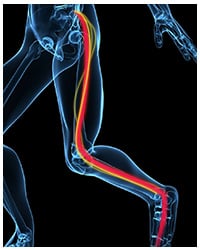What causes sciatica?
Sciatica is pain caused by the irritation of the sciatic nerve. It is usually caused by a compressed nerve in the lower back.
Most sciatica cases are caused by a slipped disc. The slipped disc may put pressure on your nerve. In rare cases, the nerve may be compressed by a tumour or damaged by a disease such as diabetes.

What does having sciatica feel like?
If you have sciatica, you are most likely to feel lower back pain that radiates down through the hip and buttock, and down one leg. The pain may worsen when you sit, cough or stand. Your leg may also feel numb or weak. These symptoms may appear suddenly, and last for days or weeks.
Make an appointment to consult an orthopaedic specialist if you suspect you are suffering from sciatica pain.
How can I relieve sciatica pain?
How is Sciatica diagnosed?
A physical examination is the most common way of diagnosing sciatica. To determine if the sciatic nerve is irritated, the orthopaedic specialist may ask you how the pain started, and where it is located. You may also be asked to perform various activities, such as:
- Walking on toes or heels
- Rising from a squatting position
- Lifting your legs one at a time while lying on your back
If you have sciatica, your pain will likely worsen when performing these activities.
Your orthopaedic specialist may also request for additional tests, such as an x-ray or MRI, to get more information about the location and cause of your sciatica. This can help your orthopaedic specialist develop an appropriate course of treatment for you.
What treatments are there for Sciatica?
Most sciatica cases improve with self-care measures to relieve sciatica pain. To relieve your pain and avoid future injuries, your orthopaedic specialist may recommend the following treatments:
Medications
Your orthopaedic specialist may prescribe painkillers to provide short-term relief from sciatica.
Steroid injection
In some cases, your orthopaedic specialist may inject steroids into the area around the sciatica nerve to reduce the pain.
Physical Therapy
To manage sciatica pain and prevent future injuries, your orthopaedic specialist may refer you to a physical therapist. He or she will design a rehabilitation programme for you, which includes exercises to correct your posture, strengthen the muscles supporting your back, and improve your flexibility.
Surgery
Surgery for sciatica may be an option for people whose condition did not improve or have worsened despite treatment. The surgery will address the cause of the pinched nerve and relieve the pressure put on it.
Make an appointment
Make an appointment to consult an orthopaedic specialist. Select "Specialist Appointment". Under Specialist Appointment Details, select "Orthopaedic Surgery" or "Pain Management".
Make an enquiry. We will get back to you within 2 working days. You can reach us at 6311 2310.